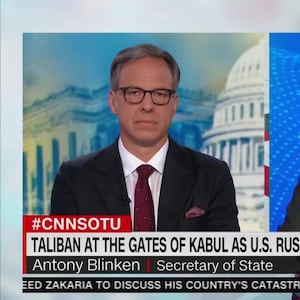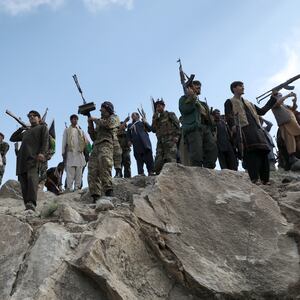The Biden administration is urging Americans not to jump to conclusions about the deteriorating stability of a country occupied by U.S. forces for two decades—no matter how obvious those conclusions appear to be.
“This is manifestly not Saigon,” Secretary of State Antony Blinken said on This Week on Sunday.
“Remember, this is not Saigon,” Blinken said on State of the Union a few minutes later.
But as foreign service officers evacuated the American embassy in Kabul, hastily burning sensitive documents and queuing up for U.S. military flights out of the country amidst the collapse of the Afghan government, the comparisons between the two failed wars became increasingly impossible to avoid.
“It does feel like the fall of Saigon today,” said Rep. Debbie Dingell (D-MI), a staunch Biden ally, on MSNBC Sunday morning. “I’m not going to lie.”
In conversations with national security experts, members of Congress, veterans of the war and administration officials, it became clear on Sunday that while the unfolding disaster in Afghanistan is ultimately the bastard child of many fathers, the chaotic withdrawal stands out as one of the greater missteps of the War on Terror.
Just last month, the White House was enormously confident in the belief that U.S.-trained security forces in the country would be able to fend off the Taliban from retaking Afghanistan, with Biden himself declaring that “likelihood there’s going to be the Taliban overrunning everything and owning the whole country is highly unlikely,” and dismissing comparisons to the fall of Saigon out of hand.
“None whatsoever. Zero,” Biden told a reporter on July 8, after he was asked about the risk of the situation in Afghanistan unraveling into the chaos of the final days of the Vietnam War. “The Taliban is not the North Vietnamese army. They’re not remotely comparable in terms of capability. There’s going to be no circumstance when you’re going to see people being lifted off the roof of an embassy of the United States from Afghanistan.”
“It is not at all comparable,” Biden concluded.
A mere five weeks later, the White House’s message on the fall of Kabul to Taliban forces is a repetition of those same talking points, irrespective of the increasingly dire situation on the ground.
The message, repeated across three Sunday morning programs by Blinken—and reiterated to lawmakers during a Sunday morning briefing—defended Biden’s belief that the Taliban’s resurgence was “highly unlikely” by claiming that the president always knew that the once-and-future government of Afghanistan was gaining strength.
“He said and we’ve said all along that the Taliban was in a position of strength,” Blinken said on This Week, shortly before declaring on Meet the Press that the administration has “known all along that the Taliban was at its strongest position in terms of its strength since 2001,” which he then expanded upon during State of the Union: “We’ve said all along, including the president, that the Taliban was at its greatest position of strength at any time since 2001, when it was last in charge of the country.”
This message has not proven convincing to Democrats on Capitol Hill—and is aging worse by the hour.
The Democratic caucus now feels that the White House “really screwed this up,” according to a Democratic official, with anger focused on Blinken and National Security Advisor Jake Sullivan in particular.
The official added both the progressive and moderate wings of the party were unified in their frustration: the former for the apparent lack of care paid to protecting and evacuating women’s-rights and democracy activists, and the latter for Biden’s decision to leave the country altogether.
Republicans, meanwhile, got perhaps their biggest opportunity yet to capitalize on a Biden faceplant. The number two House Republican, Rep. Steve Scalise (R-LA), went on CBS’ Face The Nation to call it “an epic failure on President Biden's foreign policy” and said he should either “clean house” or admit he misled the public.
Some Republicans, however, recognize the glass house that criticism is coming from.
“This is the low moment of Biden’s presidency thus far,” a senior GOP aide told The Daily Beast. “His central case throughout 2020 and during his Administration has been that he’s the steady hand to stem the Trump chaos. More than anything else, this throws a wrench into that narrative.”
“The problem for Republicans,” the aide added, “is that our ability to go on offense against him is somewhat limited because Trump essentially had the same policy position.”
The lion’s share of the blame for the fall of Kabul, according to Blinken and the administration, lies not with the most obvious suspects—Biden’s maladroit withdrawal plan, President Donald Trump’s careless exit deal, President Barack Obama’s decision to double down on the American military presence, President George W. Bush’s diversionary invasion of Iraq, Donald Rumsfeld, the global heroin trade, Taliban allies in the Pakistani government, the military-industrial complex, and Afghanistan’s well-earned historical reputation as “the graveyard of empires”—but instead with Afghan security forces, a point that Blinken repeated almost verbatim during his trio of Sunday morning talk show appearances.
On State of the Union, the failure of the 300,000 Afghan security forces—who cost the U.S. government nearly $90 billion to train despite many of them not actually existing—has happened “more quickly than we anticipated,” said Blinken, while on This Week, he repeated that their inability to defend the country “has happened more quickly than we anticipated.”
But even within the administration, concerns about the potential collapse of the Afghan government have simmered ever since Biden told reporters last month that it was “not true” that the intelligence community had assessed that such a collapse was likely, if not imminent.
“The idea that the Taliban may retake—sorry, has retaken—Afghanistan simply because they’re more ‘motivated’ or ‘ideologically driven’ is a little bit of a cop-out,” a National Security Council staffer told The Daily Beast. “The ‘300,000-strong army’ exists on paper. Today, the real number may not even be a quarter of that. That’s the problem.”
Rep. Jake Auchincloss (D-MA), himself a veteran of the war in Afghanistan, told The Daily Beast that while the failure of Afghan security forces is the most obvious reason for the swift collapse of country’s central government, the unfolding disaster in Afghanistan is the consequence of decades of poor decision-making on nearly all fronts.
“When you ask ‘whose fault is that,’ it is the national security establishment over the last 20 years compounding one another’s errors, ad infinitum,” said Auchincloss, who as a Marine commanded infantry in Afghanistan and led patrols through villages contested by the Taliban. “It’s the fault of the Afghan central government. We, for 20 years, gave them fertile soil to plant the seeds of civil society, of rule of law, of representative governance, and instead, the Afghan leadership provided incompetence and corruption, and that cratered the morale of their frontline troops when the Taliban started to advance.”
Corruption within the higher levels of the Afghan security forces in particular, Auchincloss said, may have doomed any efforts at a stable withdrawal or central government.
“I patrolled alongside the Afghan unit police,” Auchincloss said. “These men are tactically sound fighters and they care about their homeland, but they were let down by their highest levels of leadership.”
“Imagine risking your life, day in, day out, knowing that there are enough resources to support you, and yet not getting them, because those in positions superior to your own are using them for their own purposes,” Auchincloss said. “I mean, imagine how demoralizing that would be?”









